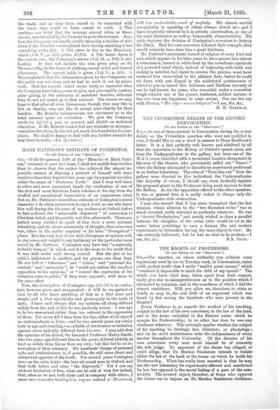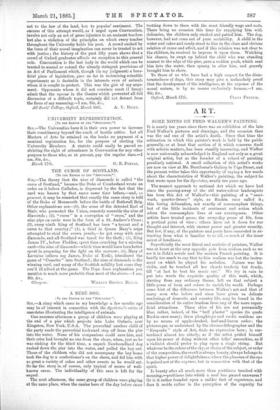THE RIGHTS OF PROFESSORS.
I-To THE EDITOR OF THE "SPECTATOR."J SIR,—The reporter, on whose authority you criticise some expressions used by me on Tuesday week, in Convocation, states (with perfect truth) that I spoke "amidst great uproar," which "rendered it impossible to catch the drift of my speech." The words you have cited may, taken apart from their context,. easily give rise to misapprehension as to the position which I attempted to maintain, and in the soundness of which I feel the utmost confidence. Will you allow me, therefore, to state, as briefly as may be, the real drift of an argument which was heard by few among the hundreds who were present in the
?
Every Professor is, as regards the method of his teaching, subject to the law of his own conscience, to the law of the land,. and to the terms embodied in the Statute under which he accepts his Professorship ; to no other law does he owe any obedience whatever. This principle applies whether the subject of his teaching be theology, law, literature, or physiology;. and on its strict maintenance rests the independence of every teacher throughout the University. Of the dictates of his own conscience every man mast himself be of necessity the sole judge. No opponent of the decree has alleged, or could allege, that Dr. Bind= Sanderson intencbs to violateeither the law of the land, or the terms on which be holds his Professorship. What has really been asserted is that he may use the new laboratory for experiments allowed and sanctioned by law, but opposed to the moral feeling of a part of the community. The avowed object, therefore, of those who opposed the decree was to impose on Dr. Barden Sanderson obediences not to the law of the land, but to popular' sentiment The success of this attempt would, as I urged upon Convocation, involve not only an act of gross injustice to an eminent teacher. but also a violation of the principles on which every teacher throughout the University holds his post. A crowd excited by the force of their moral imagination can never be trusted to act with justice ; the history of the past fifty years shows that a crowd of Oxford graduates affords no exception to this general rule. Convocation is the last body in the world which can be trusted to amend or extend the already stringent provisions of an Act of Parliament which, though (in my judgment) a beneficial piece of legislation, goes as far in restraining scientific -experiments as is desirable in the interests even of animals whom it is sought to protect. This was the gist of my argument. Opponents whom it did not convince must (I fancy) admit that the uproar in the theatre which prevented all full discussion of a difficult topic, certainly did not detract from -the force of my reasoning.—I am, Sir, &c., All Soule' College, Oxford, March 18th. A. V. DICEY.



































 Previous page
Previous page